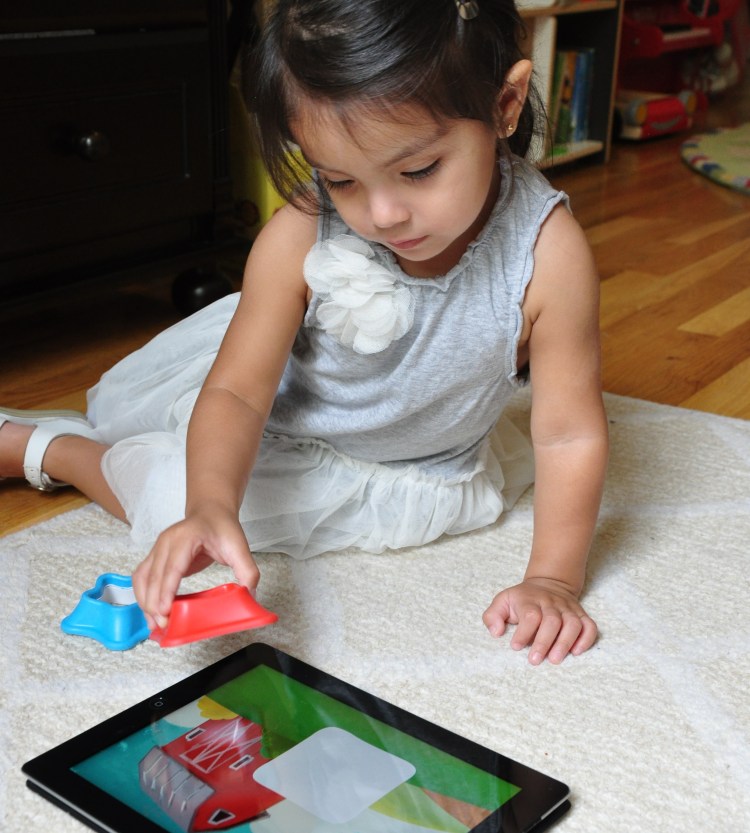A three-year-old may be a whiz on the iPad, but this won’t get him/her very far without fine motor skills.
Tiggly is an ed-tech startup that brings together digital and physical play. The company has closed a $500,000 seed round, released its products for sale on Nordstrom.com earlier this month, and will start selling Tiggly toys at hundreds of Apple retail stores in North America, Europe, and Australia in November.
Tiggly makes iPad toys for toddlers. Its set of four shapes come with sensors that replicate the human touch so the iPad games can identify them.
“Moms and dads are giving kids under the age of five a smart device to distract them, but there is this other reality,” cofounder and COO Bart Clareman said in an interview with VentureBeat. “70 years of academic research says that physical play is a critical component of early cognitive development. We bring the educational benefits of physical play to the iPad.”
The shapes cost $29.99, but the three accompanying apps are free — Tiggly Safari, Tiggly Stamp, and Tiggly Draw. The games prompt toddlers to combine the shapes into animals, food items, seasonal objects, and imaginary characters. The activities are designed to develop spatial thinking, motor skills, and language, as well as creativity.
Tiggly’s cofounder and Chief Learning Officer Azi Jamalian is a PhD candidate in early childhood development at Columbia University. She said that interacting with real objects and manipulating them in space is important for the development of fine motor skills and an important foundation for STEM subjects. Seeing the image of a square on a screen is not the same as seeing it, feeling it, and rotating it, and sensorially understanding its four corners and four sides.
“Kids need to learn how to plan and execute actions and how to act on an object to reach certain goals,” she said. “You could argue that kids should just play with blocks, but blocks don’t play with the child. They don’t say ‘circle’ or ‘square’ or write words, they don’t adapt the experience to a child’s age or level or knowledge like a digital platform can.”
Both Clareman and Jamalian said they are preparing for a world 5 to 10 years from now that is increasingly digital and where the lines between digital and physical play are blurred.
Tiggly’s apps are designed to be educational. The focus is on learning, rather than entertainment, which Clareman said distinguishes the company from “appcessory” offerings by Disney and Crayola. He also said the physical shapes help Tiggly stand out from the saturated early childhood app market.
Another competitor is Tangible Play, a StartX company that combines virtual games with physical pieces, although it seems to be targeting an older age group.
Tiggly emerged out of Harvard Business School, where cofounder and CEO Phyl Georgio and Clareman won a business plan competition as part of HBS’ FIELD Program. The company then tried to raise funds on Kickstarter last year, but fell short of the goal.
Undeterred, the team continued working away and managed to close some strong retail distribution deals and raise a seed round, which came from an Indian VC firm called Kae Capital, as well as a private investor.
Tiggly plans to release four or five more games by Christmas. Down the road, it will explore paid apps as well as new physical products and topics, such as composition and decomposition, sizes, ordering objects based on their sizes, and interactive stories.
“We are starting from the first principals of learning and looking at what educational objectives we can satisfy,” Clareman said. “Our intention as a company is to grow older with the kids.”
VentureBeat's mission is to be a digital town square for technical decision-makers to gain knowledge about transformative enterprise technology and transact. Learn More

